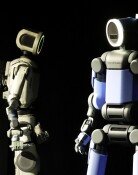It Was Our Dream Under Colonization to Become a Soldier for Korea
It Was Our Dream Under Colonization to Become a Soldier for Korea
Posted June. 27, 2005 06:18,
When we did not have sovereignty, serving our country as a soldier was a big dream. After the independence of our country, we became richer, but unfortunately, young people are less and less patriotic nowadays.
On the eve of 56th memorial day of Baekbeom Kim Koo, 83-year-old Kim Shin, the curator of the Kim Koo Museum & Library, who looks young and healthy for his age, spent a busy day preparing for the memorial day event and checking the process at the Kim Koo Museum & Library in Hyochang-dong, Yongsan-gu, Seoul.
Kim Shin, who is also chairing the Association of Commemorative Services, is the only survivor of Baekbeom Kim Koos two sons and three daughters.
In 1922, he was born in Shanghai, China and spent his young years struggling for the independence of Korea with his father. He graduated from the Chinese Air Force Academy. He was studying at an aviation school in the U.S. when Korea regained freedom from Japan.
In September 1947, he returned to Korea and went to the North with his father to meet then leader Kim Il Sung to prevent the establishment of South Koreas government without North Korean participation in April 1948.
After avoiding any contact with the media for years for fear of his ruining his fathers reputation, he frankly told his stories in an interview with this newspaper that he had kept inside of his mind. This was the first time he had an interview with the media since 1994.
Kim Shin, who resembles his father who was modest and determined, began talking, saying, I have a hearing problem but I am healthy.
When some powers-that-be betrayed the country and enriched themselves under the Japanese colonization, my father did not spend a single day without worrying about the future of the nation.
Twenty years after the assassination of Kim Koo, a statue in his honor was set up on Namsan Mountain in Seoul. With the establishment of the Kim Koo Museum & Library three years ago, Kim Shin decided to devote himself in spreading his fathers patriotism in Korea.
During the interview, he observed, I feel frustrated when I hear todays young adults give up their citizenship in order not to go to the military, with an excited tone.
Patriotism is different from emotional nationalism, said Kim, emphasizing, Only through educating posterity about love for our nation and people, the only power to sustain and develop the country, can I keep alive the spirit of my father who was shot dead 56 years ago.
On the Korea-Japan relationship, he said, The bright line is that Japan is the offender and Korea is the victim. As seen during the summit, Japan has yet to acknowledge its wrongdoings, said Kim. He beamed at the subject of the revaluation initiative for Kim Koo in China.
On the internet, there are many articles expressing Kim Koo as a like-minded man in the resistance movement against Japan. Some broadcasters are making documentary films and dramas about him.
China is preparing for the 60th anniversary of its victory against fascism on September 3. I hope the revaluation movement and 60th anniversary of independence in Korea serve as a chance to deepen Korea-China relations, said Kim.
weappon@donga.com






![[단독]“권성동, ‘王’자 노리개 등 장식 상자 2개로 1억 받았다”](https://dimg.donga.com/c/138/175/90/1/wps/NEWS/IMAGE/2026/01/22/133211754.1.jpg)
